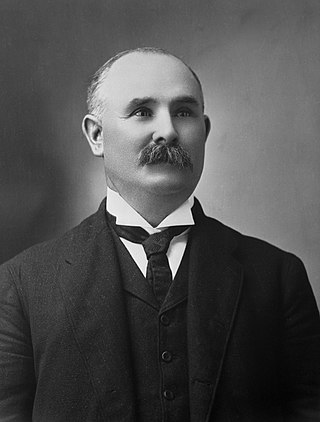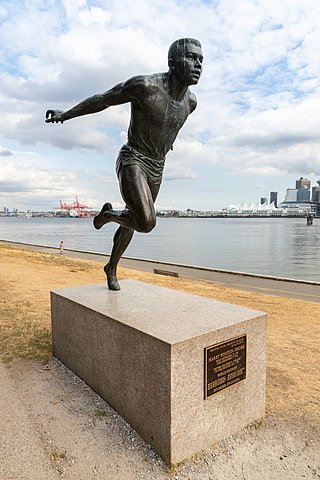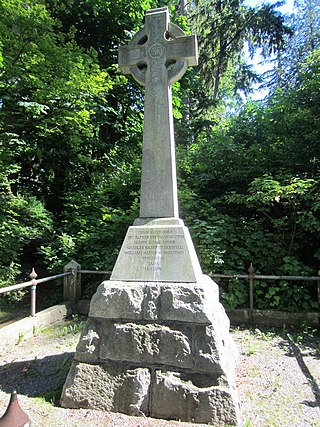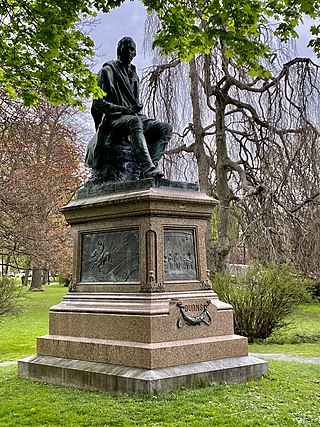
Stanley Park is a 405-hectare (1,001-acre) public park in British Columbia, Canada that makes up the northwestern half of Vancouver's Downtown Peninsula, surrounded by waters of Burrard Inlet and English Bay. The park borders the neighbourhoods of West End and Coal Harbour to its southeast, and is connected to the North Shore via the Lions Gate Bridge. The historic lighthouse on Brockton Point marks the park's easternmost point. While it is not the largest of its kind, Stanley Park is about one-fifth larger than New York City's 340-hectare (840-acre) Central Park and almost half the size of London's 960-hectare (2,360-acre) Richmond Park.

Queen's Park is an urban park in Downtown Toronto, Ontario, Canada. Opened in 1860 by Edward, Prince of Wales, it was named in honour of Queen Victoria. The park is the site of the Ontario Legislative Building, which houses the Legislative Assembly of Ontario. The phrase "Queen's Park" is regularly used as a metonym for the Government of Ontario or the Legislative Assembly of Ontario.

The West End is a neighbourhood in Vancouver, British Columbia, Canada, located between the Coal Harbour neighbourhood and the financial and central business districts of Downtown Vancouver to the east, Stanley Park to the northwest, the English Bay to the west, and Kitsilano to the southwest across the False Creek opening.

Charles Carlos Marega was a Canadian sculptor in the early 20th century.

The history of Vancouver, British Columbia, is one that extends back thousands of years, with its first inhabitants arriving in the area following the Last Glacial Period. With its location on the western coast of Canada near the mouth of the Fraser River and on the waterways of the Strait of Georgia, Howe Sound, Burrard Inlet, and their tributaries, Vancouver has – for thousands of years – been a place of meeting, trade, and settlement.

Patrick Burns was a Canadian rancher, meat packer, businessperson, senator, and philanthropist. A self-made man of wealth, he built one of the world's largest integrated meat-packing empires, P. Burns & Co., becoming one of the wealthiest Canadians of his time. He is honoured as one of the Big Four western cattle kings who started the Calgary Stampede in Alberta in 1912.

Central Memorial Park is a park located in central Calgary's Beltline district. Sometimes referred to as Central Park or as Memorial Park, the area is home to the Memorial Park Library, an equestrian statue of Russell Lambert Boyle, and a cenotaph. The former Colonel Belcher Veterans Hospital was located across 4th street SW to the west, now the site of the Sheldon M. Chumir Centre. The Memorial Park Library and the surrounding park were named a National historic site in 2018

Public art in Vancouver is an important aspect of the urban environment. Large portions of public art in the city – located in British Columbia, Canada – are funded by the provincial and federal government. Up to 1% of the budget of a building can go towards the construction of public art.

The Robert Burns Memorial, created by sculptor George Anderson Lawson, is a monument located at Dorchester Square in Downtown Montreal.

Victoria Park is an urban park on Spring Garden Road in Halifax, Nova Scotia, Canada, across from the Halifax Public Gardens.
Elek Imredy was a Hungarian sculptor who emigrated to Vancouver, British Columbia, Canada in 1957. His most notable work is Girl in a Wetsuit, which is located in Stanley Park.

Robert Burns is a bronze portrait statue of Robert Burns by John Steell. Four versions exist, in New York City, Dundee (Scotland), London (England), and Dunedin.

A bronze sculpture of American pioneer, newspaper editor and historian Harvey W. Scott (1838–1910) by Gutzon Borglum, sometimes called Harvey Scott or Harvey W. Scott, was installed on Mount Tabor in Portland, Oregon, United States, until being toppled in October 2020.

Harry Jerome is an outdoor 1986 bronze sculpture by Jack Harman of Canadian track and field runner Harry Jerome, installed at Stanley Park in Vancouver, British Columbia.

The Chehalis Cross, or Chehalis Monument, is a Celtic cross memorial commemorating the eight people who died when the tugboat Chehalis sank off Stanley Park. The monument is installed west of Brockton Point in Vancouver, British Columbia.

More than 160 monuments and memorials to the Confederate States of America and associated figures have been removed from public spaces in the United States, all but five since 2015. Some have been removed by state and local governments; others have been torn down by protestors.

A statue of Robert Burns stands in Washington Park in Albany, New York, United States. The statue was designed by Charles Calverley and was unveiled in 1888. Four bas-reliefs around its pedestal, in part designed by George Henry Boughton, were later added in 1891. The statue is one of the oldest pieces of public art in the park.
A number of monuments and memorials in Canada were removed or destroyed as a result of protests and riots between 2020 and 2022. These included six sculptures of Sir John A. Macdonald, the first prime minister of Canada, three of other figures connected to the Canadian Indian residential school system, two of Canadian monarchs, one of the British explorer Captain James Cook and one of John Deighton, a bar-owner whose nickname inspired the name of Vancouver's Gastown district.

















